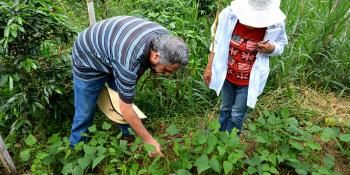What do we need to know to make climate-smart agriculture a reality?

For countries to effectively implement climate-smart agriculture, they need the right tools and solutions. CCAFS, FAO and partners are making progress in identifying knowledge gaps and developing an evidence base to support future progress.
In the context of increased challenges to global agriculture and food security due to climate change, Climate-Smart Agriculture (CSA) is gaining acceptance as a way for the sector to adapt to the impacts of climate change, increase productivity, and reduce/remove greenhouse gas emissions. The emerging Global Alliance for Climate-Smart Agriculture endeavours to bring together diverse stakeholders including Governments, farmers, private sector, civil society organizations, and the research community to work towards successful implementation of Climate-Smart Agriculture.
Knowledge for CSA
For the effective roll-out of CSA at a meaningful scale, it is crucial that implementing entities have at their fingertips a strong evidence base and a range of solutions which can be applied in various contexts. The Food and Agriculture Organization of the United Nations (FAO) and the CGIAR research program for Climate Change, Agriculture, and Food Security (CCAFS) have joined to form a Knowledge Action Group for Climate-Smart Agriculture, which endeavours to support members of the future Alliance by identifying and filling knowledge gaps which hinder adoption of CSA practices. In order to identify the knowledge gaps and priorities in a participatory manner, FAO and CCAFS conducted an extensive global survey. The initial set of results from the survey, identified knowledge priorities to be:
- Technical interventions and practices in CSA
- Support, services and extension for CSA
- Evidence base of CSA
- Inclusive knowledge systems for CSA
- Integrated planning and monitoring for CSA
These priorities will guide future research activities in the CSA domain.
Global vs Regional Priorities
While it is valuable to identify global knowledge priorities and needs, CSA is highly context-specific in terms of implementation. Therefore, knowledge priorities and needs may also differ according to the context. In consideration of this, FAO and CCAFS jointly organized a consultation with key stakeholders in Asia at the recent consultative meeting of the Global Alliance for Climate-Smart Agriculture in Hanoi, Vietnam. The session aimed to identify key knowledge priorities for Asia, and map out differences in relation to global priorities.

Speaker at the consultative meeting of the Global Alliance for Climate-Smart Agriculture
At the session, CCAFS Regional Program Leader for Southeast Asia, Leocadio Sebastian pointed out that in Asia, various countries are at different levels of vulnerability. In Southeast Asia, Vietnam, Cambodia, and Lao PDR are among the most vulnerable countries, and therefore activities in the region need to address country specific vulnerabilities. (Powerpoint presentation on R4D Collaboration on Climate Change in Southeast Asia)
Sebastian also noted that other countries in the region too were faced with specific challenges related to climate change. For instance, in Indonesia, there is a need to mitigate the impact of oil palm as a driver of deforestation. In the Philippines, sea level rise is the pressing issue. These examples highlight how actions at regional, subregional, and country-levels need to be context specific. However, in the region as a whole, climate variability, sea-level rise, and greenhouse gas emissions are of major importance. In addressing these issues, the regional knowledge priorities were similar to the global ones. However, the order of ranking differed in the region, pointing towards the diversity in the region.
Research institutions and extension services charged with generating knowledge which is context-specific and demand-oriented, can benefit from interaction and exchange, so that they can collectively address knowledge gaps in the region, and avoid fragmentation of efforts. Regional and country-level institutions also play a key role and their work should be complimentary to the efforts of international organizations. Participants also highlighted the need for greater clarity on the conceptual framework of CSA, the need for a farmer-focused approach, and the need for cost benefit analyses to empower farmer decisions-making, as additional factors to be considered in the region.

CCAFS researchers, government extension agents, development partners, are testing a variety of promising farming practices that could improve adaptation to and mitigate climatic changes, and manage risks associated with climate change. Photo: S. Kilungu (CCAFS)
The role of CGIAR and CCAFS
CGIAR is playing a prominent role in contributing to the knowledge base for CSA, this includes efforts through its Climate Change, Agriculture and Food Security (CCAFS) research program, a 10-year strategic research partnership with Future Earth, which brings together the world’s leading scientists on climate science, agricultural science, development research and earth system science. The program’s primary concern is to identify and address the most important interactions, synergies and trade-offs among climate change, agriculture and food security.
In addition to efforts through CCAFS, CGIAR plans to align its research agenda to support the implementation of CSA. This will include: (1) partnerships to deliver ambitious targets by forging partnerships with development agencies on food and nutritional security, and adaptation to and mitigation of climate change; (2) research for impact by undertaking activities needed to ensure that the targets are achieved. This will include action and policy research to deliver short-term outcomes, on the one hand, and longer term breeding programs to have climate-ready crops, livestock and fish, on the other hand; and (3) allocating a substantial amount of the CGIAR’s annual budget to research for development for CSA. These efforts demonstrate the solid commitment of the CGIAR Consortium in general, and CCAFS in particular, to the Global Alliance for CSA.
Read more from the CSA meeting in Hanoi: Getting climate-smart talk on the top agenda
Further resources:
www.climatesmartagriculture.org/en/
Dhanush Dinesh is the Global Policy Engagement Manager of CCAFS.



